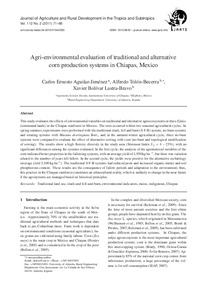Aufsatz

Agri-environmental evaluation of traditional and alternative corn production systems in Chiapas, Mexico
Zusammenfassung
This study evaluates the effects of environmental variables on traditional and alternative agroecosystems in three Ejidos (communal lands) in the Chiapas rainforest in Mexico. The tests occurred within two seasonal agricultural cycles. In spring-summer, experiments were performed with the traditional slash, fell and burn (S-F-B) system, no-burn systems and rotating systems with Mucuna deeringiana Bort., and in the autumn-winter agricultural cycle, three no-burn systems were compared to evaluate the effect of alternative sowing with corn (no-burn and topological modification of sowing). The results show a high floristic diversity in the study area (S_S = 4 - 23%), with no significant differences among the systems evaluated. In the first cycle, the analysis of the agronomical variables of the corn indicated better properties in the fallowing systems, with an average yield of 1950 kg ha^‑1, but there was variation related to the number of years left fallow. In the second cycle, the yields were positive for the alternative technology (average yield 3100 kg ha^‑1). The traditional S-F-B systems had reduced pests and increased organic matter and soil phosphorous content. These results are the consequence of fallow periods and adaptation to the environment; thus, this practice in the Chiapas rainforest constitutes an ethnocultural reality, which is unlikely to change in the near future if the agrosystems are managed based on historical principles.
Zitierform
In: Journal of Agriculture and Rural Development in the Tropics and Subtropics. Kassel : Kassel University Press. - Vol. 112, No. 2 (2011), S. 71-86Sammlung(en)
Vol 112, No 2 (2011) (Journal of Agriculture and Rural Development in the Tropics and Subtropics (JARTS))Zitieren
@article{urn:nbn:de:hebis:34-2012011640325,
author={Aguilar-Jiménez, Carlos Ernesto and Tolón-Becerra, Alfredo and Bolívar Lastra-Bravo, Xavier},
title={Agri-environmental evaluation of traditional and alternative corn production systems in Chiapas, Mexico},
year={2011}
}
0500 Oax 0501 Text $btxt$2rdacontent 0502 Computermedien $bc$2rdacarrier 1100 2011$n2011 1500 1/eng 2050 ##0##urn:nbn:de:hebis:34-2012011640325 3000 Aguilar-Jiménez, Carlos Ernesto 3010 Tolón-Becerra, Alfredo 3010 Bolívar Lastra-Bravo, Xavier 4000 Agri-environmental evaluation of traditional and alternative corn production systems in Chiapas, Mexico / Aguilar-Jiménez, Carlos Ernesto 4030 4060 Online-Ressource 4085 ##0##=u http://nbn-resolving.de/urn:nbn:de:hebis:34-2012011640325=x R 4204 \$dAufsatz 4170 7136 ##0##urn:nbn:de:hebis:34-2012011640325
<resource xsi:schemaLocation="http://datacite.org/schema/kernel-2.2 http://schema.datacite.org/meta/kernel-2.2/metadata.xsd"> 2012-06-15T09:06:47Z 2012-06-15T09:06:47Z 2011 1612-9830 urn:nbn:de:hebis:34-2012011640325 http://hdl.handle.net/123456789/2012011640325 eng Kassel University Press Urheberrechtlich geschützt https://rightsstatements.org/page/InC/1.0/ traditional land use slash-and-fell-and-burn environmental indicators maize indigenous Chiapas 630 Agri-environmental evaluation of traditional and alternative corn production systems in Chiapas, Mexico Aufsatz This study evaluates the effects of environmental variables on traditional and alternative agroecosystems in three Ejidos (communal lands) in the Chiapas rainforest in Mexico. The tests occurred within two seasonal agricultural cycles. In spring-summer, experiments were performed with the traditional slash, fell and burn (S-F-B) system, no-burn systems and rotating systems with Mucuna deeringiana Bort., and in the autumn-winter agricultural cycle, three no-burn systems were compared to evaluate the effect of alternative sowing with corn (no-burn and topological modification of sowing). The results show a high floristic diversity in the study area (S_S = 4 - 23%), with no significant differences among the systems evaluated. In the first cycle, the analysis of the agronomical variables of the corn indicated better properties in the fallowing systems, with an average yield of 1950 kg ha^‑1, but there was variation related to the number of years left fallow. In the second cycle, the yields were positive for the alternative technology (average yield 3100 kg ha^‑1). The traditional S-F-B systems had reduced pests and increased organic matter and soil phosphorous content. These results are the consequence of fallow periods and adaptation to the environment; thus, this practice in the Chiapas rainforest constitutes an ethnocultural reality, which is unlikely to change in the near future if the agrosystems are managed based on historical principles. open access In: Journal of Agriculture and Rural Development in the Tropics and Subtropics. Kassel : Kassel University Press. - Vol. 112, No. 2 (2011), S. 71-86 Aguilar-Jiménez, Carlos Ernesto Tolón-Becerra, Alfredo Bolívar Lastra-Bravo, Xavier Gedruckte Ausg. im Verlag Kassel Univ. Press (www.upress.uni-kassel.de) erschienen. </resource>
Die folgenden Lizenzbestimmungen sind mit dieser Ressource verbunden:
Urheberrechtlich geschützt

